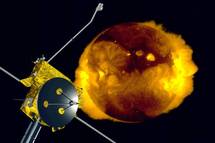
ESA and the US space agency were planning to send their final radio communication to the lonely Ulysses at 1535 GMT, and then pull the plug on the probe as it floats further and further away from Earth.
Since its launch into space in October 1990, Ulysses, named after the king of Ithaca in Greek mythology, has scanned the far reaches of the sun on a journey which has taken it some nine billion kilometers (5.5 billion miles).
One of its discoveries was that the magnetic fields of the sun spread their influence across the whole solar system, something that had previously not been known.
"This is very important because regions of the sun not previously considered as potential sources of hazardous particles for astronauts and satellites must now be taken into account," said Marsden.
Ulysses also helped to prove that during much of the sun's 11-year solar cycle, solar winds travel nearly twice as fast as had been believed.
Scientists originally thought that the speed of solar wind -- a constant stream of particles emitted by the sun -- was about 400 kilometers (250 miles) per second.
The probe also detected and analyzed cosmic dust flowing into our solar system from deep space, showing that it was at least 30 times more abundant than astronomers had thought.
Unexpectedly, new measurements of helium isotopes created billions of years apart also confirmed cosmological theories about the Big Bang -- and the likely fate of the Universe.
NASA and ESA were planning to send their final communication from the Jet Propulsion Laboratory in Pasadena, California.
After that Ulysses, weighing some 379 kilos (830 pounds) with 10 observation instruments on board, will float free.
---------------------------------------------------------------------------------------------------------------------------
Since its launch into space in October 1990, Ulysses, named after the king of Ithaca in Greek mythology, has scanned the far reaches of the sun on a journey which has taken it some nine billion kilometers (5.5 billion miles).
One of its discoveries was that the magnetic fields of the sun spread their influence across the whole solar system, something that had previously not been known.
"This is very important because regions of the sun not previously considered as potential sources of hazardous particles for astronauts and satellites must now be taken into account," said Marsden.
Ulysses also helped to prove that during much of the sun's 11-year solar cycle, solar winds travel nearly twice as fast as had been believed.
Scientists originally thought that the speed of solar wind -- a constant stream of particles emitted by the sun -- was about 400 kilometers (250 miles) per second.
The probe also detected and analyzed cosmic dust flowing into our solar system from deep space, showing that it was at least 30 times more abundant than astronomers had thought.
Unexpectedly, new measurements of helium isotopes created billions of years apart also confirmed cosmological theories about the Big Bang -- and the likely fate of the Universe.
NASA and ESA were planning to send their final communication from the Jet Propulsion Laboratory in Pasadena, California.
After that Ulysses, weighing some 379 kilos (830 pounds) with 10 observation instruments on board, will float free.
---------------------------------------------------------------------------------------------------------------------------









 Home
Home Politics
Politics









